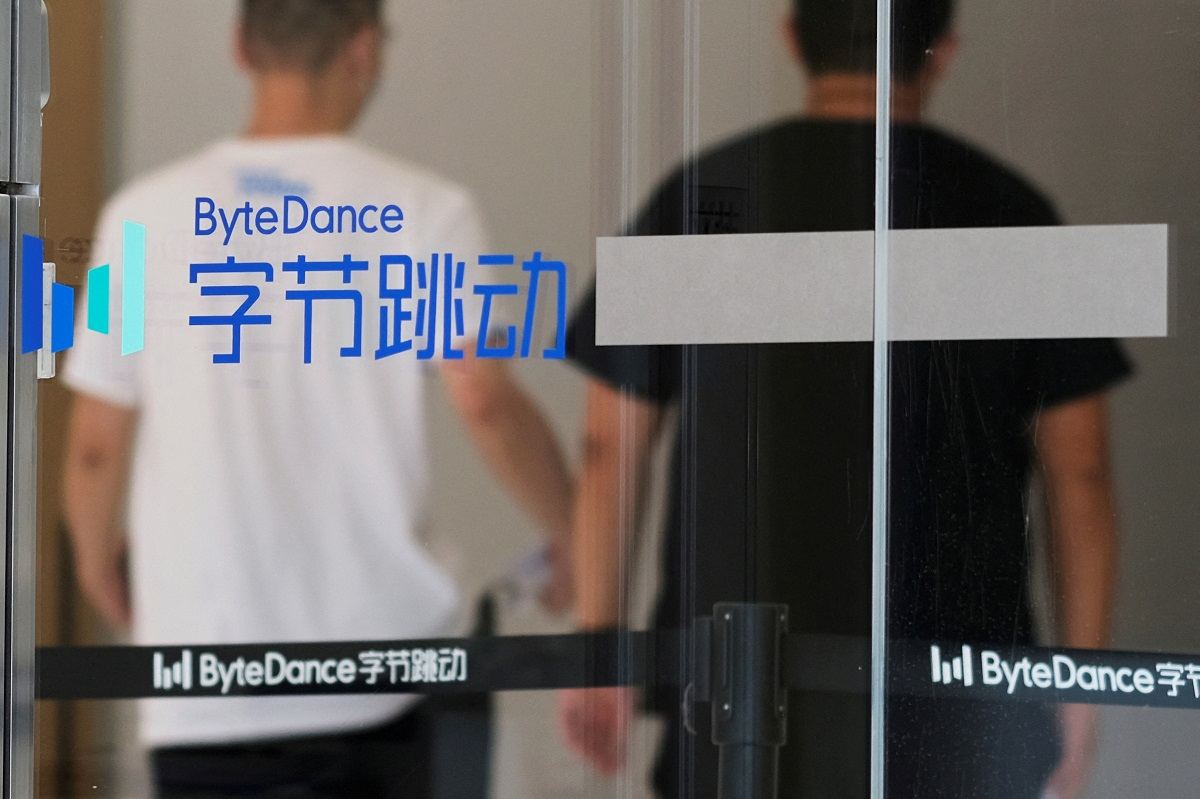
People walk past a logo of Bytedance, the China-based company which owns the short video app TikTok, or Douyin, at its office in Beijing, China July 7, 2020.
16:10 JST, March 16, 2023
(c) 2023, · NATIONAL, BUSINESS, TECHNOLOGY, NATIONAL-SECURITY, WHITEHOUSE · Mar 16, 2023 – 11:47 AM
The Biden administration is pushing a plan that would require TikTok’s Chinese owners to divest from the popular video app, in an escalation of its efforts to address national security concerns about the company’s Beijing-headquartered owner ByteDance.
The Committee on Foreign Investment in the United States in recent days approached TikTok with a series of tougher options, including divestiture, according to a person familiar with the deliberations, who like others interviewed spoke on the condition of anonymity to discuss sensitive matters.
TikTok has been in negotiations with CFIUS for over two years. As the app has surged in popularity during that time, so have policymakers’ worries that it could be exploited to expose Americans’ sensitive data or spread propaganda.
TikTok’s political problems are mounting in Washington a week before company CEO Shou Zi Chew is set to testify on Capitol Hill. Chew is expected to be a political punching bag as lawmakers from both parties sound the alarm about the perceived security risks presented by the app and increasingly call for a TikTok ban.
A week ago, the White House endorsed a bipartisan bill that would grant the Commerce Department broad authorities to ban or limit TikTok and other technology apps rooted in foreign countries. However, efforts to ban an app used by more than 100 million people in the United States could also run afoul of the First Amendment.
TikTok confirmed it was in communication with CFIUS, but there was not yet a clear recommendation for what a divestiture of the app’s Chinese owners would look like in practice.
“If protecting national security is the objective, divestment doesn’t solve the problem: A change in ownership would not impose any new restrictions on data flows or access,” said Brooke Oberwetter, a TikTok spokesperson. “The best way to address concerns about national security is with the transparent, U.S.-based protection of U.S. user data and systems, with robust third-party monitoring, vetting and verification, which we are already implementing.”
Oberwetter said the company was disappointed with CFIUS’s direction following more than two years of efforts to develop a plan to restructure the company’s handling of Americans’ data. The company also has owners who are not Chinese, so it remains unclear how a divestiture order would technically work, she said.
The White House National Security Council and the Treasury Department declined to comment. CFIUS officials did not respond to requests for comment. The Wall Street Journal first reported on CFIUS’s proposal.
Eric Sayers, a nonresident fellow at the American Enterprise Institute, said the government has effectively created two options for TikTok: Either divest or face the bipartisan legislation, called the Restricting the Emergence of Security Threats that Risk Information and Communications Technology Act. Both could lead to the same result of forcing Chinese stakeholders to sell off their shares in the company.
“This signals to reluctant Republicans on the Hill that the government is serious about divestiture and makes the chances RESTRICT passes quickly even higher,” Sayers said.
Two people with knowledge of the discussions said the Justice Department had been resistant to any option short of a forced sale. Deputy Attorney General Lisa Monaco said in a statement last week after the announcement of the RESTRICT Act that the United States faces “systemic threats from a range of technology products and services sourced from foreign adversaries.”
The stance effectively kills TikTok’s chances of winning approval for Project Texas, the $1.5 billion restructuring proposal it has spent years crafting in hopes of assuaging U.S. national security concerns. The plan would have subjected TikTok to closer government oversight than any U.S. social media company has ever faced, including measures for third-party protection and review of the app’s data and code.
Under the deal, TikTok’s U.S. operations would have been consolidated into a subsidiary overseen by a CFIUS-approved board of directors, though ByteDance would have remained the ultimate owner. TikTok officials said they proposed the final deal to CFIUS in August. Justice and Treasury Department officials were unconvinced it would be enough, according to two people familiar with the negotiations.
Oberwetter said the company is continuing to move forward with its security initiatives, including Project Texas. The company also announced another data security project for Europe, dubbed Project Clover.
The government’s stance comes three years after the Trump administration pushed to ban the app or sell itself to an American company, with the U.S. Treasury collecting a “very substantial” share of the proceeds. The Chinese government responded that year by adding recommendation algorithms like those used by TikTok to its export-control list, effectively banning the sale.
A divestiture order probably would require Chinese officials’ approval, and the government in Beijing has given no indication that its stance has changed toward what it has criticized as U.S. corporate bullying.
An attempt at forced divestiture also probably would face legal action from ByteDance, which was founded by Chinese entrepreneurs and says it is not owned or controlled by any government entity. About 60 percent of ByteDance’s shares are owned by institutional investors, including the American investment giants BlackRock, General Atlantic and Sequoia. Company employees, including thousands in the United States, own 20 percent. The remaining 20 percent is owned by ByteDance’s founders, although they retain a larger voting stake.
The Trump administration’s ban attempt collapsed in court after federal judges ruled that the government had not given evidence of TikTok’s harm and that such a move could violate Americans’ free-speech rights.
ByteDance and TikTok officials have in recent months begun offering briefings to lawmakers, researchers and journalists on the Project Texas efforts. ByteDance officials in China have increasingly called on the company to speak more proactively in defense of itself after months in which they had hoped the CFIUS process would conclude with Project Texas’s approval, according to two people familiar with their strategy.
Chew has also in recent weeks conducted private meetings with lawmakers to argue in the company’s defense, including about its commitment to protecting U.S. user data and its independence from the Chinese government.
Top Articles in News Services
-

Survey Shows False Election Info Perceived as True
-

Hong Kong Ex-Publisher Jimmy Lai’s Sentence Raises International Outcry as China Defends It
-

Japan’s Nikkei Stock Average Touches 58,000 as Yen, Jgbs Rally on Election Fallout (UPDATE 1)
-

Japan’s Nikkei Stock Average Falls as US-Iran Tensions Unsettle Investors (UPDATE 1)
-

Trump Names Former Federal Reserve Governor Warsh as the Next Fed Chair, Replacing Powell
JN ACCESS RANKING
-

Producer Behind Pop Group XG Arrested for Cocaine Possession
-

Japan PM Takaichi’s Cabinet Resigns en Masse
-

Japan Institute to Use Domestic Commercial Optical Lattice Clock to Set Japan Standard Time
-

Man Infected with Measles Reportedly Dined at Restaurant in Tokyo Station
-

Israeli Ambassador to Japan Speaks about Japan’s Role in the Reconstruction of Gaza
























